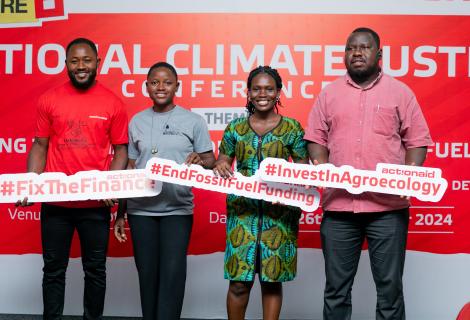AAG and Partners advocates for bold action, transformative partnerships, and a renewed commitment to combat climate change and Indigenous seed development at 2024 National Climate Justice Conference.

Dubbed “Shifting Finance from Fossil Fuels and Industrial Agriculture to Promoting Food Sovereignty through Agroecology and Indigenous Seed Development", this year's conference directly addresses the world's urgent challenges while highlighting solutions within our reach.
Held on September 25 and 26, the conference significantly builds on the work of ActionAid Ghana’s Country Strategy Paper (CSP) VII which prioritises Green Economy and Secure Livelihoods. Over the years, AAG have made substantial strides in supporting sustainable agricultural practices, promoting environmental justice, and ensuring secure livelihoods for marginalized communities.
The conference's theme underscores the findings in ActionAid’s flagship reports. Our 2023 report, “How the Finance Flows: The Banks Fueling the Climate Crisis,” exposed the staggering amount of finance being funneled by global banks into fossil fuels and industrial agriculture—industries that exacerbate climate change while undermining the livelihoods of millions of smallholder farmers. The 2024 follow-up report, “How the Finance Flows: Corporate Capture of Public Finance Fueling the Climate Crisis in the Global South,” shines a light on how public finance is being co-opted by corporate interests, prioritizing destructive industries over sustainable, people-centred solutions such as agroecology. The reports reiterates the need for a fundamental shift in financing is urgently needed. We must redirect financial resources towards practices that promote food sovereignty, build climate resilience, and ensure justice for marginalized communities. This shift is critical for establishing sustainable agricultural systems and safeguarding the dignity and rights of smallholder farmers.
As a country, we must understand that Agroecology is more than a farming method—it is a holistic system that works harmoniously with nature, regenerating soils, conserving water, nurturing biodiversity, and ensuring that farmers can produce healthy, culturally relevant food. Agroecology increases resilience to climate impacts and provides long-term food security, particularly empowering smallholder farmers and women who have been custodians of traditional farming knowledge for generations.
At the conference, stakeholders deliberated on the need for Indigenous seed development, describing it as essential. Participants affirmed that seeds are naturally adapted to local climates and ecosystems, making them more resilient to extreme weather events, such as the droughts we are currently facing. Smallholder women farmers also disclosed that Indigenous seeds carry centuries of knowledge passed down through generations; and by supporting indigenous seed systems, we preserve biodiversity, safeguard food sovereignty, and protect farmers from the control of multinational corporations that dominate the global seed market.
Promoting food sovereignty through agroecology and indigenous seed development is not just an environmental necessity but a matter of justice. Food sovereignty gives communities control over their food systems, shielding them from the dominance of multinational corporations that push industrial seeds and chemical inputs. It empowers farmers to determine what, how, and for whom they grow food based on local needs rather than corporate profits.
At ActionAid Ghana, we are fully committed to driving this transformation. We have witnessed firsthand the power of agroecology and indigenous seed development in the communities we work with. AAG's 2024 climate justice initiatives, including the April digital mobilizations and our ongoing 3000-signature campaign, demonstrate the collective will of Ghanaians to demand accountability from those who control the flow of finance. Together with smallholder farmers, women, and youth, we call for climate finance to support agroecological practices and indigenous seed systems. Furthermore, the findings of ActionAid's 2024 flagship report build on those of the previous year. In 2023, it will be recalled that AAG federation uncovered how private financial institutions bankroll fossil fuels and industrial agriculture. This year, the report reveals how corporate interests have similarly captured public finance. Both reports underscore the urgent need for radical reform in global financial systems.
In an elaborated panel discussion, experts campaigned that there must be an immediately shift of the flow of finance to confront the climate crisis and secure food sovereignty. They appealed to for both Public and private financial resources to be channeled into practices like agroecology that build climate resilience, protect biodiversity, and empower communities.
Experts also reiterated that the droughts, floods, and food shortages are symptoms of a broken system. But there is hope. By shifting finance toward agroecology and indigenous seed development, we can rebuild our agricultural systems, restore ecosystems, and protect the rights of smallholder farmers.
In line with ActionAid's Global Action Week for Climate Justice, the Country Director, John Nkaw called on financial institutions to stop funding fossil fuel projects driving the climate crisis. He also invited participants and well meaning Ghanaians to join the crucial fight by signing the petition demanding that banks stop financing destruction and start funding sustainable solutions. He stressed that the path to a sustainable future is clear and can be clearer if we prioritise food sovereignty over corporate control, agroecology over industrial agriculture, and community resilience over profit.
The conference served as a catalyst for bold action, transformative partnerships, and a renewed commitment to climate justice.
-End-